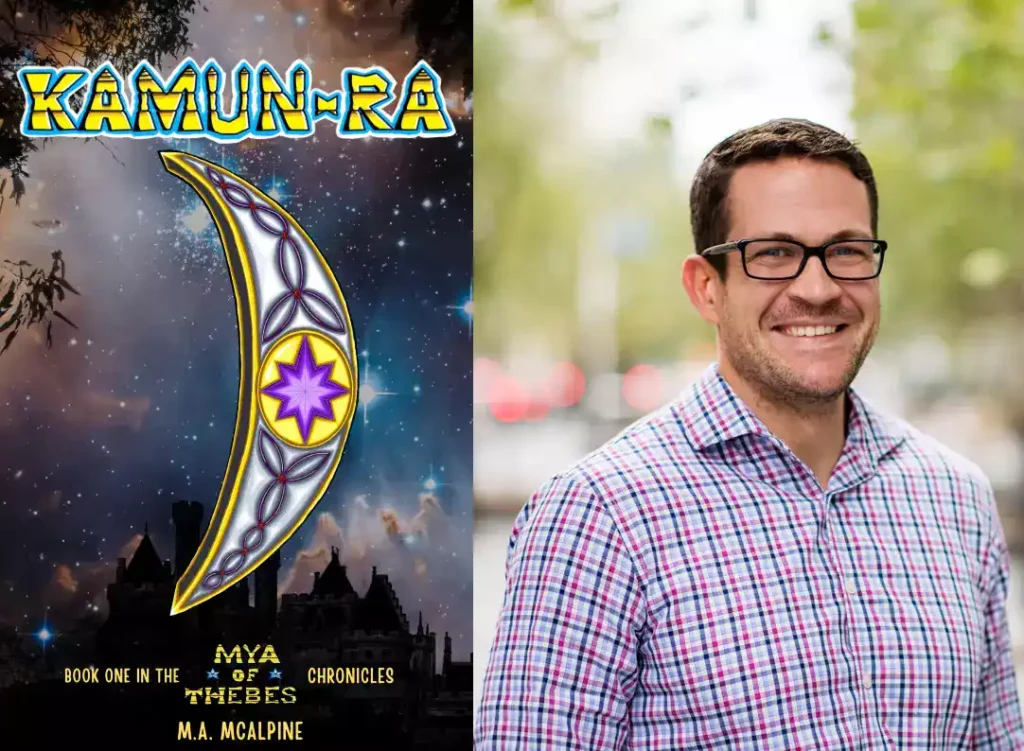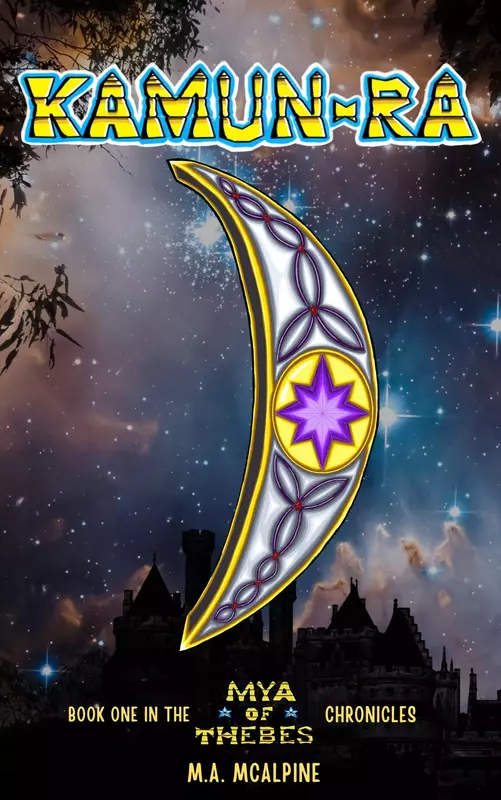This post may contain affiliate links. Read more here.

Hey everyone!
Today, I had an awesome conversation with M.A. McAlpine, a talented author whose journey from fatherhood to fantasy writing is truly inspiring.
In this Q&A, we dived into the world of Kamun-Ra, author’s creative process, unique world-building, and the powerful message of hope that resonates throughout the series.
I hope you’ll enjoy this interview! ✨
Kamun-Ra by M.A. McAlpine
‘Kamun-Ra’ is the first book in ‘The Mya of Thebes Chronicles’ series. What inspired you to start this series, and can you give us a glimpse into the world and characters you’ve created?
My inspiration is my little girl. When my wife was pregnant, all these emotions from my childhood started pouring through me. And one of the strongest was my joy of reading, and I wanted to pass that along to my little one. So, I decided to do something that I have always wanted to do. I wrote a book.
To the second part of your question, I have always had my head in the clouds, so becoming a fantasy author seemed like a natural next step. In dreaming up the world, I was inspired by our own ancient history and wondered who might have lived in those incredible ancient ruins.
Next, I took the premise that what if, instead of ancient technology that was lost, what if we lost the ability to use magic? Putting the two together, I created a magic system where physical objects are enchanted to do very specific tasks.
For example, you could enchant a building to defy the laws of physics, or you could enchant a magic torch that would flash into existence when you entered the room. The last thing that I find fascinating about our world are all the different cultures, and how each country has evolved to use the same technology in different ways.
I took this premise when world building to have each country in the Protectorate use these enchantments according to their own cultural values. This creates very different experiences for Mya, depending on where she is on her adventure.
Your book features Mya, a young protagonist who joins the Protectorate academy at Kamun-Ra on her eighteenth birthday. What qualities or experiences from your own life did you draw upon to develop Mya’s character and her journey?
The start of Mya’s journey was inspired by something that I went through myself… going to college/university and being on your own for the first time.
The first book in the series, KAMUN-RA, should really capture the thrill of being on your own, and having to face what the world throws at you without the benefit of a safety net.
The synopsis mentions that the series doesn’t adhere to traditional fantasy gender roles. Could you elaborate on this and tell us more about how you approach gender and character development in your writing?
Too often in fantasy novels, the female characters are maidens that support the brave knights. I did not want to write that kind of story for my daughter.
I wanted to write her a story where the female main character was a hero, that rushed into danger to save her friends. So, Mya is going to get into fights, and be put into dangerous situations, where she will have to dig deep within herself to prevail and save the world.
What can readers expect from the future installments of “The Mya of Thebes Chronicles,” such as “The Games” and “Soulstone”?
KAMUN-RA does a great job introducing the world and characters. The Mya of Thebes Chronicles is a series that has a hidden antagonist that is working in the shadows to undermine and destroy the Protectorate.
In The Games, Mya and her friends are training for an extreme version of gladiator games, while her hidden enemy is moving to set their trap to incite a civil war. The reader can expect lots of political maneuvering and manufacturing civil unrest.
Soulstone resumes the story right after the conclusion of The Games. Returning to Kamun-Ra, Mya and her friends realize what they are fighting, and need to decide as a group how they can defeat such an insurmountable enemy. There are a couple massive plot twists in Soulstone, so I don’t want to say too much and spoil the surprise.
You transitioned from a corporate career to pursue your passion for writing. What challenges did you face during this transition, and what advice would you give to aspiring authors looking to make a similar leap?
Honestly, I am still navigating the challenge of both right now. As much as I have learned writing my first book, I am not at the point where I can be a writer full-time. And from following many different authors on social media, I know that I am not alone in these challenges.
My advice to everyone that is struggling to get noticed: remember why you first put pen to paper. My little girl inspired to me start, but I quickly fell in love with storytelling.
So, while putting yourself out there can be hard, don’t forget why you wanted to tell your story in the first place.
You mentioned being inspired to create a world that people would fall in love with. Can you share some of the elements that you believe make your fictional world unique and captivating?
The Mya of Thebes Chronicles, at its core is an adventure novel. It will take Mya across every country in the Protectorate in her quest to keep the evil Draski from ripping it apart. Following along from earlier, when I was designing the world, I wanted to make each country feel culturally different from the next.
For the reader, this will bring them on a journey of discovery in how each country in the Protectorate has evolved to use totems differently.
This creates fantastic buildings, and enchantments that will breathe life into the world. It also allows me to make each novel in the series very different from the last, so the reader will always be brought on a different journey with Mya and her friends.
Writing can be a journey filled with self-doubt. How do you overcome moments of doubt and keep your creative process going? Are there any specific strategies or habits you find helpful?
The self-doubt is real. And honestly, I am never sure if it will ever go away.
When I am struggling with the deep, I try to focus on where I find love in the process. And for me, that is in the storytelling. I love the sensation of hitting a really good point, and fixing a plot hole so that it makes the story sing.
I love overseeing creating a world all of my own, without anyone telling me what it should be. And, when I am struggling, I try to fall back on that and remember what I love about writing.
Can you tell us about your writing routine? Do you have a specific time and place where you like to write?
Honestly? As a father, and someone who works full time, I have to fight to find time to write when ever, and where ever I can.
Usually, I can find an hour or two after my daughter is asleep and my partner and I are relaxing for the evening. I’ll have my laptop open, clicking away, and she is casually playing on her iPad.
As a writer, what message or emotion do you hope your readers take away from “Kamun-Ra” and the entire series?
There is hope. No matter how much it feels like the world is trying to rip itself apart, there is hope that the world can be a better place.
Can you give us a sneak peek into your future projects or any other creative endeavors you’re currently working on?
Well, I actually wrote the first three books in “The Mya of Thebes Chronicles” at the same time, so for the foreseeable future, I will be editing “The Games and “Soulstone” so I can continue Mya’s adventures.
What has been the most rewarding part of being an author for you so far, and what do you look forward to as you continue your writing journey?
By far the most rewarding part is when someone you don’t know reaches out and says that they love your work. It can get very dark as a new author. You are putting yourself out into the world for everyone to judge.
And you do not get to say how people should perceive your work. You can only hope that they love it. And when you hear people reach out and tell you that your writing matters, and you are telling a story that they want to hear.
Well, that makes the journey worthwhile.
Is there anything else you’d like to share with your readers or aspiring writers who might be reading this interview?
To the aspiring writers, don’t give up. It can be hard putting yourself out there. It is not my advice, and I wish I could remember who said it, but they said that the best way to advertise your current book is to write your next one.
So just keep going. It might start slowly at first, but one day you will wake up and realize that you are surrounded by people who can’t wait to read what’s next.
To all the readers out there, there is nothing wrong with escaping into the pages of a book. Keep those worlds alive by sharing the love of reading with the next generation.
For more with Matt, make sure to follow him on his social media.
Happy reading! ❤️
